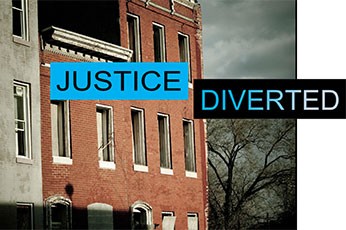



Approximately 150,000 eviction cases are filed by landlords in Baltimore City each year. And nearly 7,000 families—mostly female-headed, mostly African American—are evicted from their homes. With funding provided by the Abell Foundation, the Public Justice Center (PJC) launched an initiative to study the Baltimore District Court docket known as “Rent Court,” document the eviction process, and recommend reforms to the system.
“Justice Diverted: How Renters are Processed in the Baltimore City Rent Court“ provides a deep dive into Baltimore’s eviction crisis. Based on hundreds of surveys, extensive interviews, review of court records, and court observations, the report demonstrates that the system’s bureaucratic process largely favors landlords and puts tenants at a disadvantage in presenting defenses. For example, the system often ignores poor housing conditions, such as rodent infestation or plumbing leaks, which could justify a tenant’s decision to withhold payments.
Justice Diverted proposes five central reforms to the city’s Rent Court: reducing the number of filings through a new, pre-filing notice; increasing renters’ access to legal information before and during hearings; mandating landlord documentation of rent claims; expanding landlord licensing requirements; and funding eviction prevention programs.
The Public Justice Center conducted and wrote the study in collaboration with the Right to Housing Alliance, Dan Pasciuti, Ph.D., of Johns Hopkins University, and Michele Cotton, J.D., Ph.D., of the University of Baltimore.
Photo courtesy of Public Justice Center.